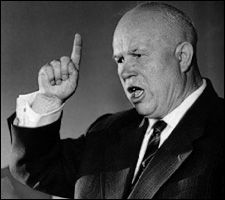
Most
languages cannot be translated word-by-word because context, shading,
and usage vary, and even those change over time. This can give us a
laugh when using mechanical translations such as Babelfish, but are
oh-so-important in contracts, treaties, science, and politics. You might
end up conveying something you did not intend, like Khrushchev in 1956.
At
the height of the cold war, Soviet premier Nikita Khrushchev gave a
speech in which he uttered a phrase that interpreted from Russian as "we
will bury you." It was taken as chilling threat to bury the U.S. with a
nuclear attack and escalated the tension between the U.S. and Russia.
However, the translation was a bit too literal. The sense of the Russian
phrase was more that "we will live to see you buried" or "we will
outlast you." Still not exactly friendly, but not quite so threatening.
That
puts a totally different light on one of the boogeymen from my
childhood. Read eight other examples of mistranslations that caused
problems
here .
 Most
languages cannot be translated word-by-word because context, shading,
and usage vary, and even those change over time. This can give us a
laugh when using mechanical translations such as Babelfish, but are
oh-so-important in contracts, treaties, science, and politics. You might
end up conveying something you did not intend, like Khrushchev in 1956.
Most
languages cannot be translated word-by-word because context, shading,
and usage vary, and even those change over time. This can give us a
laugh when using mechanical translations such as Babelfish, but are
oh-so-important in contracts, treaties, science, and politics. You might
end up conveying something you did not intend, like Khrushchev in 1956.
No comments:
Post a Comment